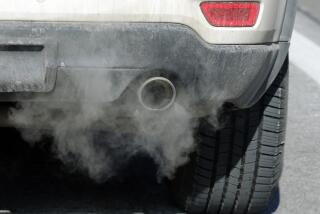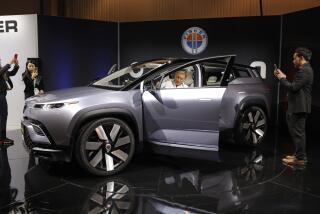Volkswagen emissions scandal expands to 11 million vehicles
The expanding Volkswagen diesel emissions scandal now includes 11 million vehicles worldwide, and threatens to destroy the credibility and market value of a global behemoth that was already showing signs of instability.
The world’s largest automobile manufacturer, Volkswagen Group was experiencing weakening sales in the U.S. and China, its two most promising areas of growth. As of the Friday before the emissions story broke, the company’s stock had already fallen to $162 a share, from a March 2015 high of $255. Midday Tuesday, the stock traded at $106.
Volkswagen has confirmed Environmental Protection Agency charges that it installed software “defeat devices” in versions of its 2009-2015 Jetta, Beetle, Golf, Passat and Audi A3 passenger cars fitted with 2.0-liter, 4-cylinder engines.
The company on Tuesday said the same software was present in as many as 11 million vehicles sold worldwide. The company said in a statement it was working “at full speed” to come into regulatory compliance.
See the most-read stories this hour >>
Facing up to as much as $18 billion in U.S. fines alone -- and liable for fines and punishments in other countries -- Volkswagen said it would also set aside $7.2 billion to cover the cost of recalls and “other efforts to win back the trust of our customers.”
That broken trust may prove equally problematic for Volkswagen’s bottom line. Many buyers feel duped into having bought a polluting car with a green marketing campaign for the “clean diesels.”
In California, which has the nation’s toughest emissions standards, outraged consumers used social media to air their anger at the company. Many said they were angry enough at the company to turn away from the brand permanently.
Owner Bob Merlis, an independent music industry publicist, said he was looking to add a second Volkswagen diesel last week.
“I went shopping for a new one, the Golf Sportwagen, but that’s so off the table now,” Merlis said. “I don’t want to do business with those criminals.”
Merlis, who loved the car because it performed well, got good mileage, and was “clean,” said he felt particularly bad because he has persuaded three friends to buy a VW diesel after buying his own.
“I thought this was the greatest car,” he said. “Now I feel completedly used, because I proselytized for it.”
In Germany, the company’s chief executive Michael Winterkorn said he would not answer calls for his resignation. But at a New York promotional event Monday night, Volkswagen’s U.S. leader Michael Horn addressed the scandal head-on.
“We have totally screwed up,” he told attendees at a Brooklyn gathering to launch the new Passat. “Our company was dishonest with the EPA, and the California Air Resources Board and with all of you.”
Horn said “this kind of behavior” was inconsistent with the company’s core values and that the automaker needed to fix the cars to prevent this from ever happening again.
SIGN UP for the free California Inc. business newsletter >>
“We have to make things right with the government, the public, our customers, our employees and also very important, our dealers,” Horn said.
The automaker has suspended sales of thousands of new and used diesel vehicles on dealer lots. The affected diesel models are Jetta (model years 2009-15), Beetle (2009-15), Audi A3 (2009-15), Golf (2009-15) and Passat (2012-15).
Volkswagen’s diesel debacle began after European regulators noticed discrepancies between emissions and performance test results and drivers’ real-world experiences.
An American institution, the Center for Alternative Fuels, Engines and Emissions (CAFEE) at West Virginia University, was eventually hired to perform emissions tests on several German cars. The group spent several months in late 2013 and early 2014 studying a Volkswagen Passat3, Volkswagen Jetta and BMW X5. They measured emissions on a dynamometer and then on the road, using a portable testing device carried in the vehicles’ trunks.
“The results showed the VW vehicles to be higher in real word emissions by 15 to 30 times,” said Dr. Arvind Thiruvengadam, a professor engaged in the study.
According to Thiruvengadam and others familiar with the technology, diesel engines emit substantial amounts of nitrogen oxide, which in combination with other pollutants causes smog and can be unhealthful.
Most diesel cars -- including those built by VW, BMW, Mercedes, Porsche, Chevrolet and other companies -- are equipped with devices or systems that eliminate most of that nitrogen oxide.
In Volkswagen’s case, those devices functioned properly only when the vehicles were being monitored in typical testing circumstances, such as on a dynamometer in a smog test station, as required by the DMV.
Thiruvengadam and his associates found, using their portable testing devices, that those devices stopped functioning when the vehicles were being driven in real-world situations.
The VW diesel revelations are not the first. More than a decade ago, government officials reached a $1-billion settlement with seven U.S. diesel engine manufacturers whom the EPA had charged with using similar “defeat devices” that illegally bypassed emission control equipment.
The manufacturers agreed to pay $83.4 million in fines, $109.5 million to fund research into clean fuel projects, and at least $850 million to produce new, cleaner engines.
WVU’s CAFEE laboratory, ironically, was built using funds from those fines.
MORE ON VW SCANDAL:
Editorial: Did Volkswagen cheat?
Volkswagen customers sound off on Twitter
Will California DMV act to ensure drivers comply with VW recall?








